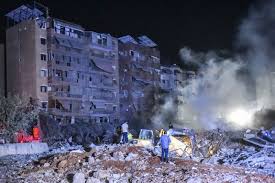Israel has conducted massive airstrikes on the Haret Hreik area in Dahiye, a southern suburb of Beirut, Lebanon. The attack, which took place on September 27, 2024, came shortly after Israeli Prime Minister Benjamin Netanyahu’s address to the UN General Assembly in New York. These massive airstrikes have not only caused significant destruction but have also raised fears of a broader conflict in the already volatile Middle East region.
The Scale and Impact of the Attack
The Israeli Air Force’s operation was characterized by its sheer magnitude and destructive power. Reports indicate that at least six buildings were completely leveled in the densely populated area of Dahiye. The Israeli Broadcasting Corporation revealed that the munitions used were US-made MK84 ‘bunker-buster’ bombs, each weighing one ton. These powerful explosives are designed to penetrate fortified underground structures, suggesting that Israel believed it was targeting high-value, well-protected assets.
The human cost of this attack has been severe. Initial reports from the Lebanese Ministry of Health stated that at least two people were killed and 76 wounded. However, these numbers are expected to rise significantly as rescue efforts continue. The Lebanese Civil Defense has been working tirelessly to extinguish fires, evacuate the injured, and retrieve bodies from under the rubble. The full extent of the casualties may not be known for days, given the scale of the destruction.
Targeting Hezbollah Leadership: Massive AirStrikes
Israeli media reports suggest that the primary target of these airstrikes was none other than Hezbollah Secretary-General Hassan Nasrallah. This claim adds a new dimension to the attack, potentially signaling a shift in Israel’s strategy towards more high-profile targets. The Israeli army stated that the target was an underground “central Hezbollah headquarters,” though they did not explicitly confirm targeting Nasrallah.
Hezbollah, for its part, has denied that Nasrallah was present at the targeted location. Muhammad Afif, a Hezbollah media relations official, stated to Iranian TV that “His Eminence the Secretary-General is fine and well, and was not at the targeted location.” Additionally, Tasnim News Agency, citing Lebanese sources, reported that no senior leaders of Hezbollah were killed in the attack. However, the Israeli newspaper Maariv, citing Israeli officials, claimed that the assassination was “successful,” adding to the conflicting narratives surrounding the operation.
International Reactions and Implications
The massive airstrikes on Beirut have drawn swift international attention and concern. The United States, Israel’s closest ally, has distanced itself from the operation. Deputy Pentagon Press Secretary Sabrina Singh told reporters that “the United States was not involved in this operation, and we had no advanced warning.” However, she did note that Defense Secretary Lloyd Austin was in contact with his Israeli counterpart Yoav Gallant “as the operation was already underway,” raising questions about the extent of US knowledge and potential tacit approval.
The attack has prompted immediate diplomatic responses. The British government, in a notable move, called on UK nationals in Lebanon to leave immediately. This urgent advisory underscores the perceived risk of further escalation and potential retaliation by Hezbollah or its allies.
The timing of the airstrikes, coming shortly after Netanyahu’s UN speech, has led to speculation about Israel’s broader strategic intentions. It may be seen as a demonstration of resolve and capability, possibly aimed at deterring further actions by Hezbollah or sending a message to other regional adversaries.
Potential for Regional Escalation
These massive airstrikes represent a significant escalation in the ongoing tensions between Israel and Hezbollah. The attack on a densely populated area of Beirut, coupled with the alleged targeting of Hezbollah’s top leadership, crosses previous red lines in the conflict. This raises serious concerns about potential retaliation from Hezbollah and its allies, including Iran.
The risk of a wider regional conflict has increased substantially. Other actors in the region, such as Syria and various Palestinian factions, may feel compelled to respond or increase their own operations against Israel. The international community, particularly the United States and European nations, faces the challenge of preventing further escalation while maintaining their strategic interests in the region.
The massive airstrikes conducted by Israel on Beirut mark a critical juncture in Middle Eastern geopolitics. As rescue efforts continue and the full impact of the attack becomes clear, the international community watches closely for potential retaliatory actions and further escalation. The alleged targeting of Hezbollah’s leadership, if confirmed, could lead to a new phase in the long-standing conflict between Israel and its northern neighbor. As tensions soar and the threat of a wider regional war looms, diplomatic efforts to contain the situation will be crucial in the coming days and weeks. The repercussions of these airstrikes are likely to reverberate throughout the Middle East, potentially reshaping alliances and conflict dynamics in this volatile region.
Related News
















